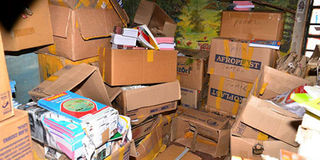Detectives uncover counterfeit books ring in City raid

Cartons filled with fake books confiscated during a raid by the Anti-Counterfeit Authority at Nyamakima, Nairobi, on October 4, 2019. PHOTO | FRANCIS NDERITU | NATION MEDIA GROUP
What you need to know:
- The Kenya Publishers Association estimates that pirated books constitute 30 per cent of the total market of school books.
- Publishers urged education stakeholders to ensure that learners purchase books from accredited sellers.
At an old dingy building on the busy Duruma Road in downtown Nairobi, a cartel has been operating undetected, shipping in bogus goods worth millions of shillings before distributing them to wholesalers and retailers.
When detectives from the Anti-Counterfeit Authority raided a warehouse at Nyamakima Complex on Friday morning, they thought they had exposed a racket dealing only in fake school books, only to discover more.
From what was initially supposed to be a brief visit and arrest of the prime suspect, Mr Joseph Mungai, the detectives spent a better part of the day combing through several other warehouses in the building. During the operation, fake toiletries, shoe polish, beverages and banned plastic bags were also found.

Mr Joseph Mungai, a suspected counterfeit goods trader, was arrested by Anti-Counterfeit Authority officers during a raid at a store in Nyamakima, Nairobi, on October 4, 2019. PHOTO | FRANCIS NDERITU | NATION MEDIA GROUP
SOPHISTICATED
The cartons upon cartons found carried Kenya Certificate of Primary Education (KCPE) and Kenya Certificate of Secondary Education (KCSE) revision books and set books.
A majority of them are being used in secondary schools, making the institutions a rich target. Those confiscated include A Doll’s House, Memories we Lost, Blossoms of the Savannah, Chozi la Heri, Kigogo and Inheritance. Books by at least seven publishers were discovered at the warehouse. Detectives say the area is notorious for black market products.
The Kenya Publishers Association estimates that pirated books constitute 30 per cent of the total market of school books, massively undercutting genuine suppliers.
Vice chairperson Simon Sossion said the issue has been complicated by counterfeiters who are using fool-proof methods to duplicate the books. "Today these business people are reproducing the books using advanced scanning technology in countries such as China. This is unlike before when books were replicated in River Road, Nairobi," he observed.
Nevertheless, he said the agency will soldier on by withdrawing licences of complicit booksellers. He decried that the biggest setback is the elusiveness of the traders.
CHALLENGES
According to publishers, the war is further being stymied by lack of stringent laws and a cumbersome legal process.
"Counterfeit cases amount to economic crimes and sabotage. They rob the government of its revenue and rip off traders and authors. Yet our judicial system views counterfeit cases as minor, thus handing offenders lenient penalties."

Longhorn Group Chief Executive Officer Maxwell Wahome displays a pirated book that was seized during a raid by the Anti-Counterfeit Authority at Nyamakima Complex in Nairobi on October 4, 2019. PHOTO | FRANCIS NDERITU | NATION MEDIA GROUP
Longhorn Group Chief Executive Officer Maxwell Wahome urged education stakeholders to ensure that learners purchase books from accredited sellers; he pointed out some of the characteristics they should look out for.
"Fake books are often compressed haphazardly using office glue. When the book drops, all the pages come apart. The print quality is also poor and the text is not clear because they are usually photocopied," he said.
In the recent years, the government has intensified the crackdown on counterfeit products, targeting both locally and internationally manufactured goods and imports.




